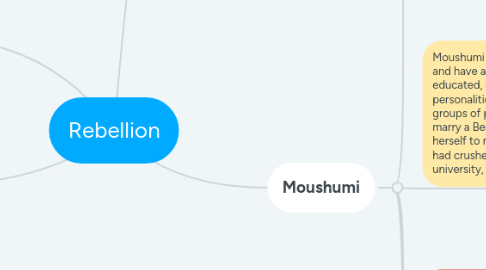
1. Ashima
2. Ashoke
3. Gogol
4. Moushumi
4.1. She rebels against the Bengal culture. For example: she learn's French, her affair with Dimitiri, she rebels against her parent's expectation to become a chemist- She went Brown university but choose a different academic path,
4.1.1. When Moushumi moves in with Graham she lives a 'secret life with two telephone lines so that her parents would never know''- her secret living witjh Graham is contrary to the Bengali culture. Moushumi challenges the social norms of the time by asking Graham to marry her. This is contrasted against Ashoke and Ashima arranged marriage- they followed tradition-> followed culture-> for 1st gen immigrants they believed that culture never fails and it must live on.
4.1.2. THEME: LOVE AND MARRIAGE: Gogol and Moushumi getting married- refer to page 222: The ''hour long watered down ceremony'' demonstrates the coming together of both Bengali families. However it also suggests the couples unwillingness to sit for the long and tedious rituals that 1st gen immigrants experienced. Gogol and Moushumi need instructions from their aunts and uncles on how to follow the rituals-> which further illustrates their unfamiliarity with the culture they were born into. The hotel management will not allow them to light the 'traditional flame'which is an example of the small but significant ways that their heritage is stifled by this foreign environment. Still, the wedding represents a triumph for this tight-knit community of immigrants, a sign of hope for the future.
4.2. Moushumi as a character:She learns French and have a love for French culture, well educated, she tries to fit in-she switches personalities when she is with different groups of people, she has an expectation to marry a Bengali- she made a pact with herself to never marry a Bengali and instead had crushes on her teachers/professors at university,
4.2.1. Similarities between Gogol and Moushumi: Both rejected their Bengali identity, dated men and women outside of their culture. When Gogol lost his father and Moushumi broke up with her fiancé Graham, the tradegy of losing a loved one bought both individuals together. This symbolises both Moushumi and Gogol returning back to their Bengali heritage.
4.3. Chapter 10- Moushumi becomes rebellious through her affair with Dimitri- She is not happy with her marriage and finds comfort in this third identity as a french teacher. This is a reflection of the way that her time in Paris was a rebellious quest to forge her own path- a path she has now abandoned in some ways. The fact she looks forward to the independence of a long-distance relationship reveals her dissatisfaction with marriage.
4.3.1. Moushumi's affair with Dimitiri: The physically interaction between Dimitiri and Moushumi sparks curiosity in Moushumi. Dimitiri represents complete rebellion from the cloistered life Moushumi lived at home, his cultured intelligence draws her in. Dimitiri offers Moushumi a new identity, which she craves desperately.
4.4. She consistently rebelled against Bengali culture- during family gatherings she 'read books'. When Moushumi wore a white wedding dress -> another example of her rebelling against the culture.
4.5. Moushumi decides to keep her name after marrying Gogol-> foreshadows that their may not work out like Ashima and Ashoke's. Gogol realisation that he does not know the meaning of Moushumi's name suggests that their relationship is shallower that he had imagined.
4.5.1. Donald and Astrid are friends of Moushumi who represent part of her identity that she is not willing to give up.
4.5.2. The pressure from Gogol's mother is a product of her fear that Gogol will not settle down, and that the Ganguli name will end with him. The idea of immigrant parents setting up their reluctant children is a common theme in immigrant literature, as the parents work to keep alive the fragile communities formed between immigrants of the same culture in a foreign land. Love and family are not separate in the view of Ashima's generation, as both are rooted in tradition.
4.5.2.1. When Gogol goes to meet Moushumi he does not expect anything to come from that meeting, as he has spent his whole life trying to rebel against his mother and the culture that he shares with Moushumi. Gogol's romantic nature, which has been a tool of rebellion and identity formation in the past, is now diriving him back toward the identity he associates with his family, and with his father.
4.5.2.1.1. Ashoke and Ashoke love, marriage and relationships were tools that bound them to loyalty and tradition. Ashima has deep reverence and respect for Ashoke (page 2- when she calls out to Ashoke, she doesn't say his name. She has adopted his surname but refuses to utter his first''
